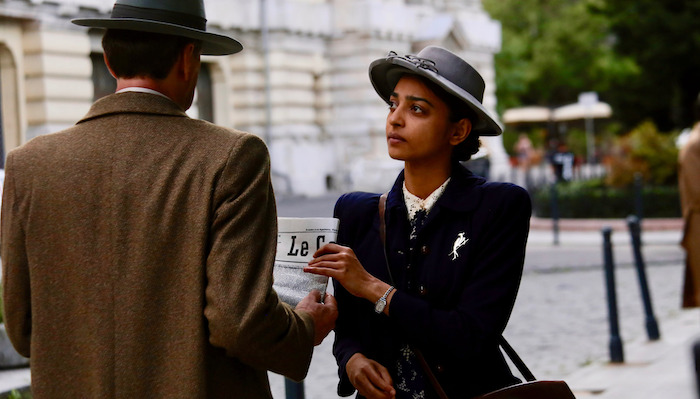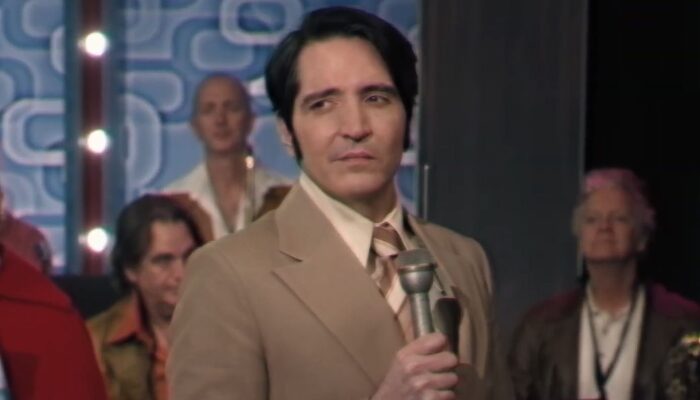Film Review: A CALL TO SPY (2019): Sarah Megan Thomas’s Passion Project is Crudely Put Together
A Call to Spy Review
A Call to Spy (2019) Film Review, a movie directed by Lydia Dean Pilcher and starring Sarah Megan Thomas, Stana Katic, Radhika Apte, Linus Roache, Rossif Sutherland, Samuel Roukin, Andrew Richardson, Laila Robins, and Marc Rissmann.
I found A Call to Spy to be pretty mediocre. While I expected to like this movie, I couldn’t help but be disappointed by the clunky, front loaded exposition. The WW2 spy drama starts on weak footing right out of the gate with a large block of tiny white on black text, which hardly felt engaging. It explains that France has fallen “to Nazi domination. Britain stands alone,” and Churchill needs unconventional spies to wage a secret war against the Germans. I don’t necessarily have a problem with a little bit of introductory text, but the formatting just feels amateurish for a big budget production. This segment is followed in short order by a radio broadcaster delivering a lengthy “As you all know…” program.
In other news, Nazi forces now occupy Poland, Austria, Denmark, Norway, Czechoslovakia, Belgium, Netherlands, Luxembourg, Yugoslavia, Greece, and Northern France. Hitler is now poised to cross the English Channel.
The delivery here feels very contrived, as most people in Britain would likely have already known this. That is to say it’s not really news and serves no purpose other than to inform the audience that the war is going badly for the Allies, which is something that’s already been established by the intro text.
Like many contemporary middlebrow prestige films, A Call to Spy attempts to enlighten its audience on cultural issues and perhaps shed some light on the relationship between the individual and society. Unfortunately the film doesn’t do much of this, spoon-feeding us exposition and stating characters’ thoughts and feelings rather explicitly instead of challenging the audience to use their brains. Compare this with the opening dialogue of another, more skillfully crafted espionage film, Tinker Tailor Soldier Spy (2011).
Trust no one Jim, especially not in the mainstream. … I understand you still have one Hungarian identity running?
I do.
I want you to go to Budapest. This is not aboveboard. Nobody else knows. They’re after my head Jim-boy. Do you understand?
This short but powerful exchange gives us all we need to know without revealing everything at once: that the two men are spies; that the one man is in danger; and that the next scene will be in Budapest so the transition makes sense. And it engages us by raising nagging questions. What kind of danger is this man in? Why does he trust Jim above anyone else? The film challenges the audience to put the pieces together as they are provided over time, and it requires us to pay a bit more attention than a typical Hollywood film would. But the experience of unraveling a good spy mystery is well worth the effort. In fact I don’t think spy movies would be enjoyable without the audience having to figure things out for themselves, as espionage is built upon the practice of keeping and stealing secrets.
A much better way to deliver exposition in A Call to Spy would have been to introduce a young spy, wet behind the ears, who could tag along and ask questions about how things work. This is a much more natural vehicle for exposition than an information dump and would be much less bothersome.
Another thing that really bothers me about this movie is that the main characters don’t have much depth beyond their selfless heroism; and while it was nice to see female war heroes being honored for their valor, this film doesn’t really do them justice as fully fleshed out human beings. Instead they feel a bit like one dimensional reflections of real people, as they don’t challenge us to consider how gender roles have held back both men and women throughout history. This film template is a well worn path in 2020, and to be politically relevant requires that it add something new to the public discourse on gender issues. Unfortunately, it has nothing original to say.
Rating: 3/10
Leave your thoughts on this A Call to Spy review and the film below in the comments section. Readers seeking to support this type of content can visit our Patreon Page and become one of FilmBook’s patrons. Readers seeking more film reviews can visit our Movie Review Page, our Movie Review Twitter Page, and our Movie Review Facebook Page. Want up-to-the-minute notifications? FilmBook staff members publish articles by Email, Twitter, Facebook, Instagram, Tumblr, Pinterest, and Flipboard.
Related Articles
FilmBook's Newsletter
Subscribe to FilmBook’s Daily Newsletter for the latest news!













